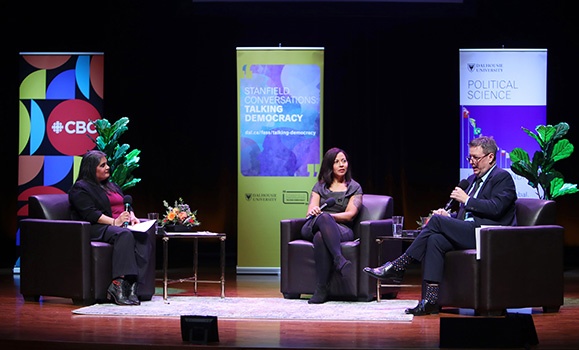With more of the world participating in nationwide votes than any previous year in history, 2024 has been dubbed the year of elections.Ã˝
And what a year it has been. Incumbents around the world have been unseated in often dramatic fashion. But the outcome of one election in particular, the U.S. presidential election, has prompted more discussion than most.Ã˝
This year‚Äôs annual Stanfield Conversation at –¬º”∆¬¡˘∫œ≤ ø™Ω±÷±≤• centred around the U.S. election and democracy's global fate. The conversation, held Wednesday (Nov.20), aimed to address the question on everyone‚Äôs mind: What does Donald Trump‚Äôs re-election as president mean for the trajectory of democratic processes worldwide?
Hosted annually by Dal‚Äôs Faculty of Arts and Social Sciences and the Department of Political Science with support from CBC Nova Scotia, the Stanfield Conversations: Talking Democracy series presents timely public panel discussions on the state of global democracy.Ã˝
, host of CBC’s , and guest moderator of this year’s conversation, posed questions about the U.S. election outcome and the increasingly widespread erosion of democratic values and institutions globally to a panel comprised of two of Canada’s brightest minds in political science and journalism:
- , Globe and Mail international affairs columnist
- , Canada Research Chair in Racial Inequality in Democratic Societies and Associate Professor of Political Science at McGill University
Here are five major takeaways from the conversation. You can watchÃ˝the full event at the bottom of this article.
Democratic backsliding
To begin the conversation, Saunders introduced the concept of ‚Äòdemocratic backsliding‚Äô ‚Äî a process that typically starts with a candidate or party winning an election and then manipulating and shutting down democratic institutions, stacking courts, altering constitutions, disenfranchising opposition parties, disempowering media outlets, and rejecting election results.Ã˝
He attributes this set of strategies to what the U.S. experienced under President-elect Trump's first term, and what they could potentially face during his next.
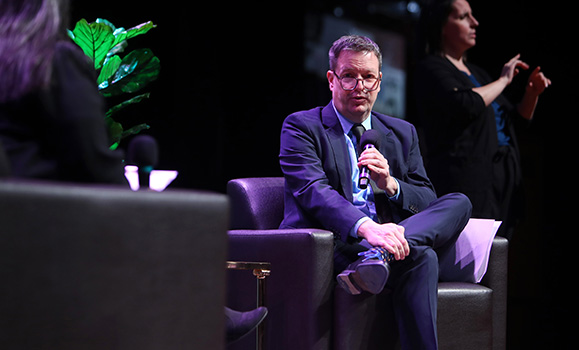
Doug Saunders.
Ã˝‚ÄúThe turn away from democracy is not driven by citizens or voters who have been failed by liberal democracy,‚Äù said Saunders. ‚ÄúRather it is driven by parties and leaders who take advantage of the chaos and vulnerability of voters.‚Äù
"Democracy erodes from the top, not from the bottom up. It will win again when we stop tolerating anti-democratic forces,” he says.
Is democracy at risk in the U.S.?
As President-Elect Trump prepares to take office in January 2025, Dr. Thompson explained how his second term could be significantly different than his last.Ã˝
She outlined three initiatives President-Elect Trump will prioritize during his term: mass deportations, the implementation of tariffs, and a newly formed department of government efficiency. She emphasized that all will carry “huge ramifications for domestic governance.”
“The types of mechanisms we relied on in 2016 to keep Donald Trump in check just aren’t there anymore and that is very concerning,” she said.
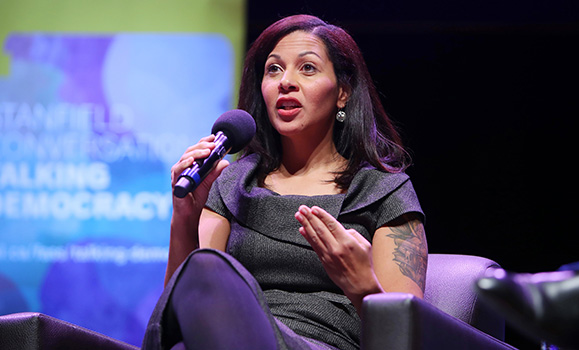 Ã˝
Ã˝
Dr. Debra Thompson.
She points to his recent proposed cabinet picks, noting that he is “not constrained in the way that his inner circle in 2016 worked to temper his worst impulses.”
Despite these challenges, Dr. Thompson remains optimistic. “We have done impossible things before in the service of progressive ends and social justice, and we will continue to do that,” she said.
Will Canada experience democratic backsliding?
Chattopadhyay brought the conversation home when she asked the panelists: “Where does Canada fit into this puzzle?”
While Dr. Thompson believes it is a bad time for incumbent politicians such as Canadian Prime Minister Justin Trudeau, she does not think Canada is at risk for democratic backsliding.
She described the voting tendencies of Canadians as akin to a pendulum that swings from one party to another and that the electorate routinely votes out incumbent parties after a period of ten years.
‚ÄúThe idea that one party can control the federal legislature for a long period of time,‚Äù Thompson says, ‚Äúthat's not an anti-democratic impulse, I think that's a democratic impulse.‚ÄùÃ˝
She adds that while the door for debates on topics such as reproductive rights or same-sex marriage remains open in the U.S., especially with Trump‚Äôs power to overrule, in Canada, these questions are no longer ‚Äúon the table to be attacked.‚ÄùÃ˝Ã˝
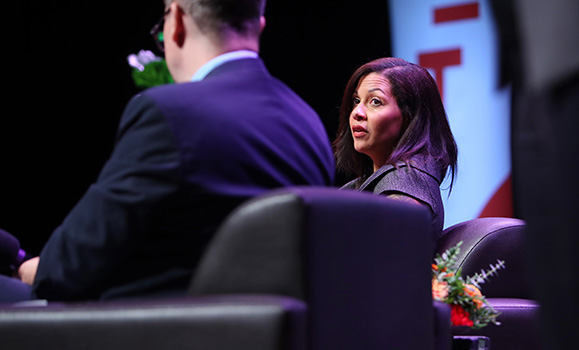 Ã˝
Ã˝
Canada’s involvement in international collaboration to support democracy
During the first Trump term, the U.S. pulled out of several major international agreements — the Paris Climate Agreement, military alliances, and a negotiated preventing Iran’s development of nuclear weapons.
"We need to be uniting with other functional democracies to prevent the U.S. under Trump from coming down on us like a ton of bricks,” said Saunders.
In the next 11 months, Canada and Germany will enter election periods. Saunders suggested it would be helpful if domestic leadership uncertainty was resolved prior to international negotiations.Ã˝
“If our trade relations are destroyed in the midst of an election, it's not going to be good. We don’t want to be fighting each other when it’s all coming down on us.”
Saunders remains optimistic that European countries will unite in the absence of U.S. trade, climate action, and military defense. ‚ÄúThere are ways that the functioning democracies of the world, including Canada can come together to face the international challenge of the threat to the democratic order‚Äù he said.Ã˝
What now? What next?
To Chattopadhyay‚Äôs question, ‚ÄúWhat else can we do to shore up democracies' crumbling foundations?‚Äù Saunders said citizens need to be educated about the consequences of their vote.Ã˝
Ã˝‚ÄúPeople today don't really believe that the government does much in their lives or is important,‚Äù he said. ‚ÄúThey don't notice how much [is] dependent on things done in government.‚ÄùÃ˝
During this challenging period in politics, Dr. Thompson said, “I am hopeful that we will find ways to resist, to build solidarity, to keep going as we always have.”
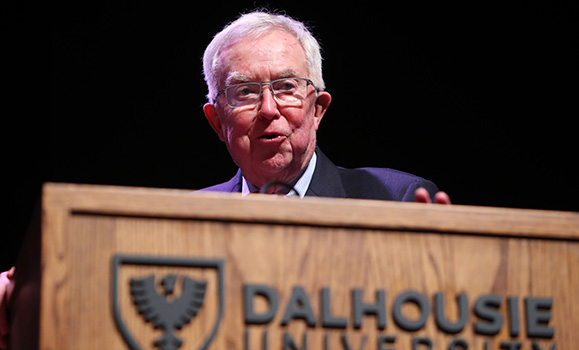
The Rt. Honourable Joe Clark, former Canadian Prime Minister and co-chair of the Friends of the Stanfield Conversations, closed the night with remarks.
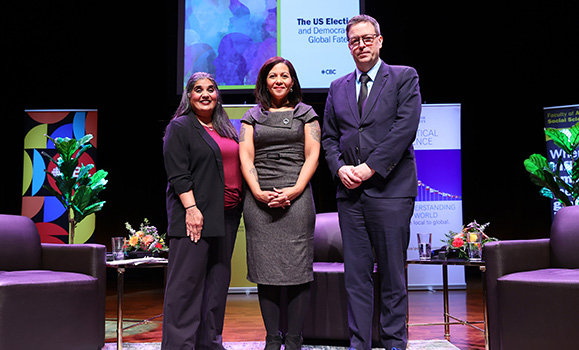 Ã˝
Ã˝

